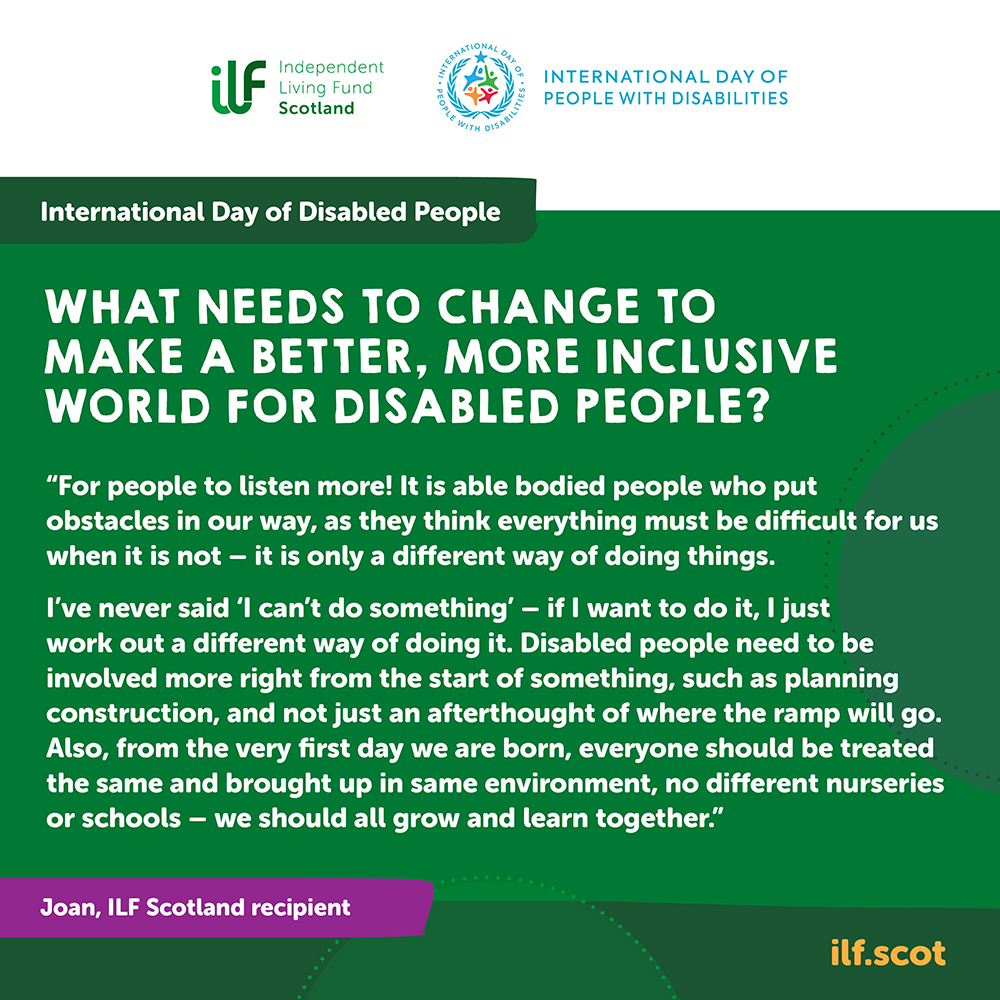
The UN International Day of Disabled People (IDPWD) is an opportunity to give disabled people a voice, champion change within society and share their stories.
As part of ILF Scotland’s IDPWD 2021 campaign, we hear some of our fund recipients to find out what this awareness day means to them, hear about the challenges they have faced in life and, most importantly, shout about their incredible achievements!
Here, we speak to Joan, an ILF Scotland recipient who has spinal muscular atrophy type 2.
Tell us a little bit about yourself
“I’m 55 years young, and a very strong-willed person who believes in living the way I want to. I have spinal muscular atrophy type 2, which I don’t allow to dominate my choices, but it has paved the road of my life for me - it has come with many challenges, but it’s just one of the different roads that each of us face in life.
“I live independently, which I love, but also manage my support to assist me in day to day living. I am retired after working for 34 years as a business advisor. Now I have time to do things at a more relaxed pace, but I’m also enjoying new-found crafts and time for interests in things such as socialising, family, and advocating for independent living issues, amongst others.”
What does IDWPD mean to you?
“This day is a chance to bring knowledge and people of all abilities together - to share experiences and open up our thoughts and ambitions towards making the world fully accessible for all.”
What do you think are the biggest challenges disabled people face today?
“Barriers by other people. Many people have very little knowledge of people who have different challenges in life so therefore do not think of how some else may manage to do things.”
What challenges have you faced personally during COVID-19?
“Adapting to working from home. Initially I thought it was perfect, not having to deal with horrible winters, cosy in my own comfortable house, peace to work undisturbed but then I was furloughed. I suddenly felt undervalued and after a few days ran into a few weeks. I realised I don’t even have any hobbies to fill my time. Sadly, though most of my weeks were filled with work, that I needed need to change. And I certainly did! I discovered how much I enjoyed painting again and uncovered more crafts. Following this, I didn’t want to return to work, managed to get early retirement and just love it. COVID made me realise what is important in life. I appreciate taking time out to just unwind, even meditate.”
What barriers have you overcome that you would like to share?
“I worked in my role for over 30 years, and colleagues soon realised I could adapt and share knowledge with them to allow me to have a successful career. Colleagues who turned into good friends admitted they had hesitations when I started working with them.
“They thought I would be a hindrance and have a chip on my shoulder, but soon realised I was approachable and knew how to do things, that I knew what I wanted and how to get it. I felt I taught them so much about my world, and that we became an inclusive workplace as a result.”
What personal achievement are you most proud of?
“My hard work in building a nice home, which gave me so much independence. It took lots of planning to find funding for personal assistants, then finding the right ones, training them, then arranging and buying things for my home and putting trust in other people.
“I found it overwhelming, but it was the best thing I have ever done. I only wish I had done it about 20 years earlier.”
How has ILF Scotland funding helped you?
The funding has helped me without a doubt - I couldn’t have got to where I am without ILF. They are so supportive because it is managed by people who face the same challenges. They understand and we think the same., and they promote independence 100%.”
What in your view needs to change to make a better, more inclusive world for disabled people?
“For people to listen more! It is able bodied people who put obstacles in our way, as they think everything must be difficult for us when it is not - it is only a different way of doing things.
“I’ve never said ‘I can’t do something’ - if I want to do it, I just work out a different way of doing it. Disabled people need to be involved more right from the start of something, such as planning construction, and not just an afterthought of where the ramp will go. Also, from the very first day we are born, everyone should be treated the same and brought up in same environment, no different nurseries or schools - we should all grow and learn together.”
Thank you so much to Joan for sharing her experiences and story.